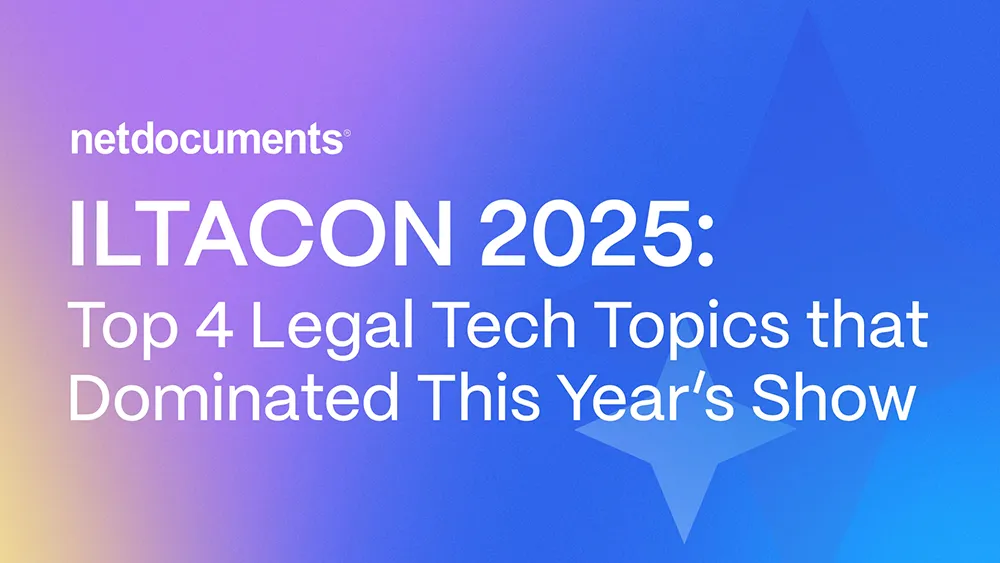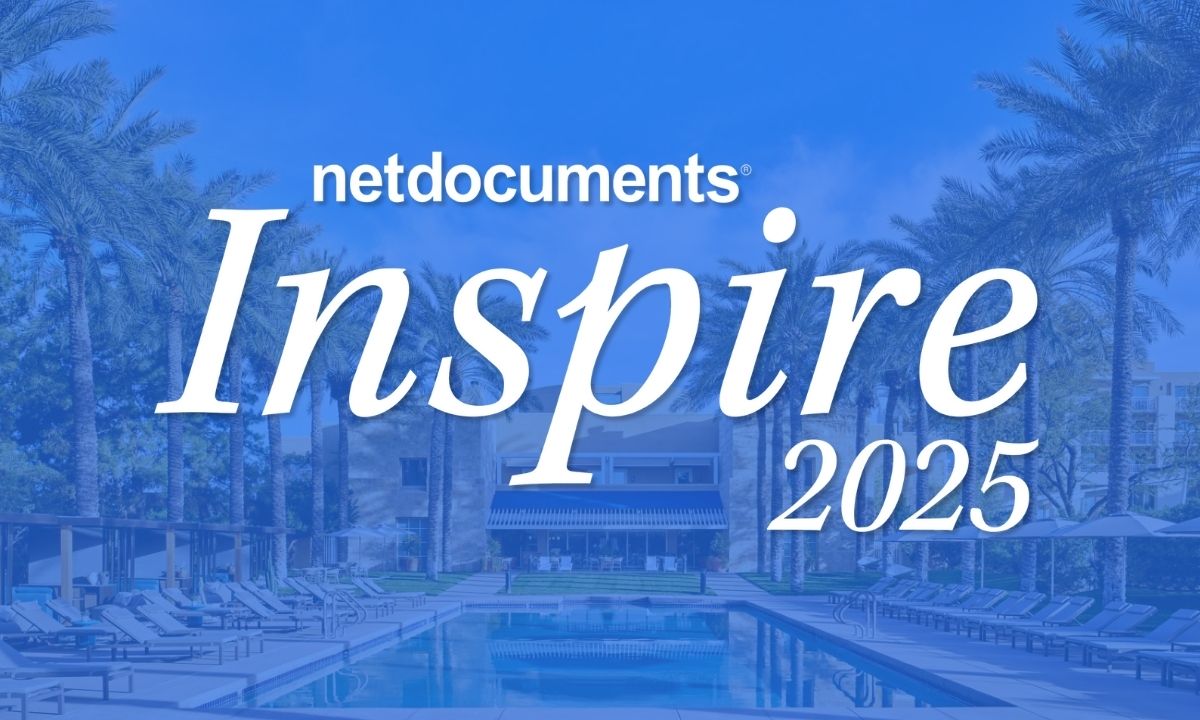
BLOG
ILTACON 2025: Top 4 Legal Tech Topics that Dominated This Year’s Show


Jill Schornack
VP of Product
ILTACON continues to serve as a legal tech industry forecast, offering a glimpse into how firms and legal departments are evolving in response to rapid technology change. At ILTACON 2025, one message resonated loudly: the future of legal work isn’t about hypothetical AI — it’s about practical, secure, and scalable intelligence embedded into everyday workflows.
1. The Rise of Agentic AI: Moving from Passive Tools to Proactive Systems
Agentic AI dominated conversations this year, not as a buzzword, but as a tangible shift in how legal professionals interact with their tools. Sessions demonstrated a clear industry pivot — from standalone AI features to integrated agents that can plan, act, and adapt within context.
Companies also used ILTACON to spread the word about their new agentic AI capabilities. NetDocuments, for instance, announced a new Agentic AI Editing Tool in Microsoft Word.
“The conversational interface is becoming the front door to key AI use cases, meaning users don’t have to train on every tool. Instead, new agents are giving us an intuitive, simple way to unlock the power of AI and make legal work more efficient.”
Michelle Spencer, Legal Technology Strategist, NetDocuments
2. Metadata and Data Readiness: The Foundation of AI Profiling
ILTACON panelists reiterated that AI is only as good as the data it works with. Clean, structured metadata is essential for extended use cases beyond simple chat outputs, especially in areas like security, search, and compliance. Panels emphasized the importance of governance frameworks and data hygiene as requirements for successful AI adoption.
What stood out this year was how AI is taking the grind out of document classification and profiling. Tasks that once required hours of manual effort can now run in the background, with AI extracting and enriching metadata automatically. Solutions like AI Profiling make it possible to capture accurate, dynamic metadata at scale — without sacrificing security — giving firms AI-ready data the moment they need it.
Critical to this process is the ability to leverage existing taxonomies that either firms have developed in-house or standard ones like the legal-specific SALI taxonomy. Not having to wait on a vendor and being able to make customizations as needed is an important component of these solutions.
“AI Profiling landed as the ‘obvious place to start’ for AI — especially when they saw how it can turn your repository of content into a rich knowledge base that can be activated across your workflows.”
Dan Hauck, Chief Product Officer, NetDocuments
3. Interoperability and Ecosystem Thinking
Legal firms are not satisfied with isolated, single-use tools, shifting toward integrated ecosystems instead. Several sessions spoke about the demand for interoperability. Speakers discussed how open platforms and secure integrations are key to building flexible, future-ready tech stacks.
This trend reflects a broader shift toward partnerships, allowing firms to combine solutions across vendors while maintaining control over their data and workflows. For instance, just before ILTACON, NetDocuments announced its ndConnect partner program and new partnerships with Legora and Harvey to enable legal professionals to securely and seamlessly integrate third-party AI solutions into their NetDocuments environment.
“The market is ready for secure, open integrations so they can avoid having to pull content out of their single source of truth. They see the risk in re-indexing documents and creating a shadow DMS versus the secure interoperability NetDocuments offers.”
Dan Hauck, Chief Product Officer, NetDocuments
4. People are as Important as the Technology
As AI adoption accelerates, so does the need for guardrails, upskilling, and sharing on how best to use it. Sessions at ILTACON tackled issues such as acceptable use policies, training for AI use, and the role of human judgement in AI-assisted decision-making. Legal tech professionals are increasingly aware that successful AI implementation requires not only technical fluency, but also strategic thinking, collaboration between business and IT to develop tools, and ethical leadership.
Top law firm CIOs also pointed out the increased demand for legal firm IT talent as firms rely more heavily on their tech stacks. Firms can differentiate themselves by how well their chosen technology improves client service and their staff’s effectiveness, making competition fierce for IT professionals who can strategically select and manage the best platforms for their teams.
“AI’s impact in law firms isn’t determined by the tools alone, but by how well people are equipped to use them. Training, developing skills like prompt engineering, and engaging those who understand workflows are all essential for AI investments to pay off.”
Michelle Spencer, Legal Technology Strategist, NetDocuments
Innovation with Intention
If ILTACON 2024 explored the possibilities of legal AI technology, 2025 focused on delivering on them. Attendees were more interested in seeing demos about specific adoption use cases and more focused on seeing results. That’s why tools that combine usability, legal context, a good user experience, and real outcomes stood out.
Ready to see what’s next? Experience how NetDocuments is turning legal intelligence into legal action — today. Schedule time to talk to an expert, or register for one of our webinars:
- APAC: Tuesday, September 9 at 12pm AEST
- EMEA: Tuesday, September 9 at 2pm BST
- NORAM: Wednesday, September 10 at 12pm ET
Share
Level up with these blogs
-

- Blog
2027 Mandate for FedRAMP Authorized Tech: Everything Legal Counsel Need to Know
Reid Cram Lead Technology Strategist A major regulatory shift is coming…
-

- Blog
True AI Search vs. AI-Assisted Querying
Jared Beckstead Senior Product Marketing Manager NetDocuments Pick any month in…
-

- Blog
eDOCS Joins NetDocuments: What Legal Professionals Need to Know About the Future of Their Document Management System
NetDocuments has completed its acquisition of the eDOCS solution from OpenText,…
-

- Blog
2026 Legal Tech Trends
Michelle Spencer Lead Technology Strategist The legal industry hit a defining…


